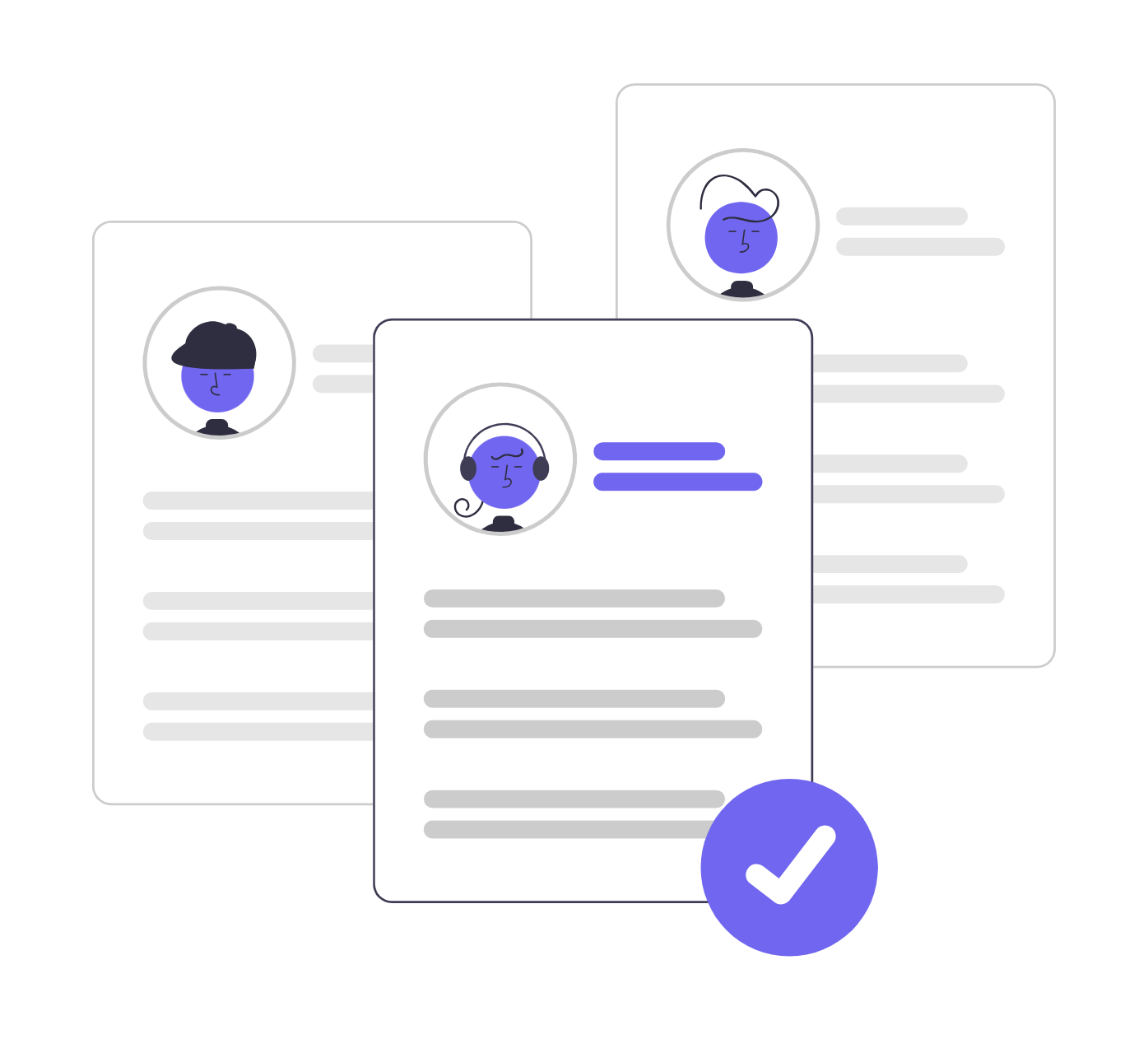Share
When you’re scanning resumes, it’s hard not to get excited about an applicant who checks every box—and then some. Years of experience, high-level roles, advanced education, glowing credentials. On paper, they seem like a dream hire.
But when a candidate is significantly more qualified than the role requires, it’s worth asking: Are we hiring a future star—or setting ourselves up for early turnover, team friction, and unmet expectations?
Hiring overqualified candidates isn’t always a mistake. But if mishandled, it can quietly erode performance, morale, and retention. In this guide, we’ll break down what “overqualified” really means, why it’s risky, and how to make smarter, more strategic decisions when these candidates come your way.
Why Hiring Overqualified Talent Seems Like the Smart Move
On the surface, the appeal is obvious. Overqualified candidates often come with:
- Minimal training needs
- Faster onboarding
- A track record of past success
- Potential to contribute beyond their role
Especially when you’re under pressure to hire quickly, it can feel like a shortcut: “Why not bring in someone who can hit the ground running?”
But beneath the surface, there are hidden trade-offs—many of which don’t show up until after the hire is made.
5 Common (and Costly) Risks of Hiring Overqualified Employees
1. Turnover Risk
Overqualified hires often treat the role as a stopgap. They take the job because the market is tight, they need a paycheck, or they’re in transition. But once a better opportunity appears, they’re gone.
Recruiters across industries share this concern frequently. Some even report overqualified hires leaving within weeks. And when they do, you’re back to square one—only with lost time, budget, and team trust.
Eliminate low-effort applicants—including those who use AI Tools to apply, copy-paste answers, or rely on "one-click apply." This way, you focus only on genuine, committed, and high-quality candidates—helping you avoid costly hiring mistakes.

2. Disengagement and Boredom
Overqualification can lead to under-stimulation. When the role doesn’t challenge them, motivation drops. Productivity slips. Team energy suffers.
Employees who feel underutilized often disengage subtly—doing the bare minimum, avoiding initiative, and eventually checking out emotionally, long before they resign.
3. Salary Mismatches
Even if a candidate agrees to your pay range at the start, expectations can shift. Raises may be expected sooner. Budget tension can build. And in many cases, resentment simmers if they feel undervalued.
One recruiter shared a real example of a candidate asking for a $50K increase on top of the posted salary range—after applying.
4. Tension with Management
Overqualified employees may resist direction, especially from less-experienced managers. They might question processes, challenge authority, or insist on doing things their own way.
That might be well-intentioned—but it can create power struggles and damage trust. It’s especially problematic in flatter teams or startups, where collaboration and humility are critical.
5. Unrealistic Promotion Expectations
Overqualified candidates sometimes view junior roles as stepping stones—and assume promotions are just a matter of time.
If those promotions don’t come fast enough, frustration sets in. Meanwhile, existing employees may feel overlooked or undervalued if the new hire moves up quickly without “proving themselves.”
Why Recruiters Hesitate—And When They’re Right To
Recruiters on hiring forums like r/recruiting and r/nonprofit are almost unanimous: hiring overqualified people is rarely about ability. It’s about alignment.
The biggest red flag isn’t the experience itself—it’s the disconnect between what the candidate wants and what the job actually offers.
Quickly identify your most promising candidates. WorkScreen automatically evaluates, scores, and ranks applicants on a performance-based leaderboard—making it easy to spot top talent, save time, and make smarter, data-driven hiring decisions.

When Hiring Overqualified Talent Can Work in Your Favor
That said, there are scenarios where hiring overqualified candidates makes perfect sense—if you’re intentional about it.
✅ When you need immediate results
For urgent projects or deadline-driven roles, experienced hires can step in with minimal ramp-up.
✅ When the candidate has clear personal motivation
Some candidates want a change of pace. Burnout, lifestyle shifts, or a desire to downsize their responsibilities can make lower roles attractive—if the motivation is genuine.
✅ When there’s a pathway for growth
If your team is expanding and promotions are on the horizon, overqualified hires can be great long-term investments.
Recruiters on hiring forums like r/recruiting and r/nonprofit are almost unanimous: hiring overqualified people is rarely about ability. It’s about alignment.
The biggest red flag isn’t the experience itself—it’s the disconnect between what the candidate wants and what the job actually offers.
How to Vet Overqualified Candidates the Smart Way
Hiring overqualified candidates isn’t about saying yes or no on principle. It’s about how you evaluate them.
Ask These Questions in the Interview:
- “What motivated you to apply for this role specifically?”
- “What are your expectations around growth or promotion in this position?”
- “Are you comfortable with the compensation range?”
- “What does success in this role look like to you?”
Easily administer one-click skill tests with workscreen. -This way you can Assess candidates based on real-world ability—not just credentials like résumés and past experience. This helps you hire more confidently and holistically.

Set Clear Expectations Early
If you do decide to move forward with an overqualified candidate, be upfront about:
- Salary ceilings
- Promotion timelines (or lack thereof)
- Team dynamics and management structure
- Scope and limitations of the role
Transparency early helps prevent resentment later.
How to Support and Retain Overqualified Hires
If the match is right, here are a few ways to make it work:
- Provide autonomy: Let them lead projects, own a process, or mentor others.
- Encourage open dialogue: Regular check-ins can help address frustrations early.
- Redesign the role slightly: Add strategic responsibilities without redefining the entire job.
- Make it a partnership: Treat them as a trusted advisor, not just a task-doer.
Overqualified Doesn’t Mean Wrong—But It Demands a Smarter Approach
The word “overqualified” gets thrown around as a catch-all rejection reason. But the truth is more nuanced.
Sometimes the most experienced person in the room is exactly what your team needs. Other times, they’re the one most likely to leave, disrupt, or stall your growth. It’s not about if they can do the job—it’s about why they want to.
FAQ
A: Not unless it’s used as a proxy for age or another protected trait. Be transparent, document your reasoning, and focus on mutual expectations.
A: Only if it’s sustainable and aligned with your team’s goals. Otherwise, you risk creating one-off exceptions that cause internal imbalance.
Yes. While experience is valuable, having too much can lead to poor role fit. Overqualified candidates may become disengaged if the work doesn’t challenge them, or frustrated if they feel underutilized. In some cases, they may view the role as a temporary solution while seeking something more aligned with their abilities or compensation expectations. This increases the risk of early turnover and team disruption.
Because being overqualified isn’t just about skills—it’s about alignment. An overqualified candidate may demand a higher salary, expect fast promotions, or resist supervision from less experienced managers. If expectations aren’t managed upfront, it can create dissatisfaction for the employee and conflict within the team.
Be transparent about the:
- Role’s scope and limitations
- Salary range
- Promotion timeline (if any)
- Team structure and culture
This helps candidates self-select and reduces the chance of mismatch.

